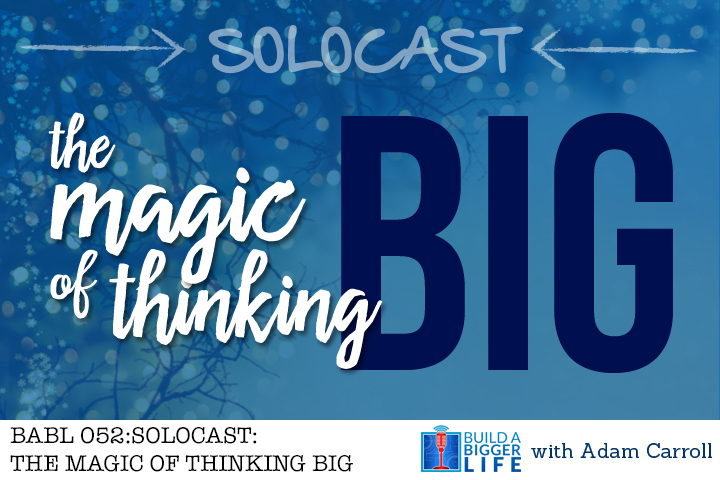This show I thought I’d break down a book that was life changing for the me the first time I read it and makes me re-think what I’m doing every time I read it. It’s a seminal classic called The Magic of Thinking Big by Dr. David Schwartz. You’ll hear just about every self-development and expert in the industry of transformation talk about this book because it was that impactful when Dr. Schwartz wrote it.
Important to know is the book was originally published in 1959 while Dr. Schwartz was a professor at Georgia State University. He’s the president of Creative Educational Services which is a consulting company that specializes in leadership development.
This book was introduced to me first when I was a door-to-door book salesman in the summers between my junior and senior year in college. I remember a mentor of mine suggested I read it and it opened the door to a number of ideas that, to this day, I use on a daily basis. The first of which in the book is the idea that to Think Big you must first BELIEVE BIG. Big thinkers, first and foremost, have an incredible amount of belief in themselves, their ideas, their abilities, their work ethic — essentially in the fact that they have big potential. They ignore naysayers and understand the difference between feedback and negative criticism from people who tend to be self-doubters in the first place.
So step 1 according to Dr. Schwartz: Here is the first step toward success. It’s a basic step. It can’t be avoided. Step One: Believe in yourself, believe that you can succeed.”
The first century philosopher Seneca put it this way: It is not because things are difficult that we do not dare; it is because we do not dare that things are difficult.
Schwartz recommends removing the word IMPOSSIBLE from your vocabulary. Things referred to as impossible or thought of as impossible summon the power of your subconscious mind to find all the reasons that you’re right. You’ll begin to notice the little things you normally wouldn’t that support the idea that whatever you’re contemplating is impossible. My friend, Rick Petry, a future guest on the podcast has lived his life by the saying Impossible is Nothing, and actually does a podcast about people who perceive life the same way.
In the book, Dr. Schwartz says “Eliminate the word impossible from your thinking and speaking vocabularies. Impossible is a failure word. The thought ‘it’s impossible’ sets off a chain reaction of other thoughts to prove you’re right.”
Walt Disney was famous for saying these words: “It’s kind of fun to do the impossible.”
Well said, Walt. Now sell me another set of mouse ears.
There is something that plagues most people when it comes to an inability to think big and a sure cure for what ails you. The plague is called Excusitis — In the book, Dr. Schwartz describes it this way: “Go deep into your study of people, and you’ll discover unsuccessful people suffer a mind-deadening thought disease. We call this disease excusitis. Every failure has this disease in its advanced form. And most ‘average’ persons have at least a mild case of it.
He goes on to say that the more successful the individual, the less inclined he is to make excuses. So which way do you lean — towards making excuses or making results happen?
I’ve heard you can’t have results and excuses at the same time.
The cure to excusitis is simple — it’s the applied knowledge that action cures fear. Excuses are generally bred from the fact that fear keeps us from attempting or achieving goals. But ACTION cures fear.
When I first agreed to go sell books door-to-door, my family thought I had joined a cult. After a few meetings, I was pretty sure I had too. But this cult had success on the brain and they told me one thing that has stuck with me every since: The only time motivation comes before work is in the dictionary. They told me when you feel fear, work. When you feel tired, work. When you need motivation… you guessed it… work.
It seems they knew that action was a sure fire cure to fear.
Schwartz talks about fear this way: “Fear of all kinds and sizes is a form of psychological infection. We can cure a mental infection the same way we cure a body infection — with specific, proven treatments… condition yourself with this fact: all confidence is acquired, developed. No one is born with confidence. Those people around you who radiate confidence, who have conquered worry, who are at ease everywhere and all the time, acquired their confidence, every bit of it.”
It seems they did it through taking action.
Action, and specifically repeated action again and again until you’ve mastered something is critical. Schwartz calls it Stickability. In a meeting with my friend, mentor and business partner Chad Carden earlier this week, he made the comment that the only reason he’s achieved what he has (and if you haven’t had a chance to listen to the podcast with Chad, you should definitely take the time)… Chad said the only reason he’s achieved what he has is he’s failed more times than most people will even try in their life. He’s quick to act, has stickability, and won’t bail when things get tough. I respect the man immensely because he’s been to the woodshed and back again and again and refuses to give up. He learns from his mistakes, succeeds in the face of adversity and never gives up.
Chad and I share a similar trait, and it’s one that Dr. Schwartz recommends in the grand scheme of Thinking Big. It involves paying close attention to the thoughts that you keep in, what Schwartz calls your Memory Bank Deposits.
There are really two kinds of deposits you can make — negative or positive. Put another way, you can either add to the memory bank or subtract from it. I overheard someone adding a negative statement to their memory bank just the other day. It started with an “I wish” statement, but the I wish was something that had happened some time ago and the wish was that it had happened differently. I asked them how that thought made them feel and after some digging into their “feelings” it was pretty clear that the I wish statement had a negative attachment.
As a general rule, I’ve found that wishes can either be positive or negative, and it’s almost always tied with the time frame in which you’re wishing. If you wish to the future, there is a positive emotion and pull to the wish. Wishes backwards, such as, I wish I would’ve gotten that part in the school play, I wish my parents would’ve stayed together, I wish that things would’ve turned out differently, etc. are making negative deposits in your mental bank.
The positive thoughts and comments you make that are deposits into your memory bank are uplifting, inspiring, and can be transformational. If you struggle with adding positive thoughts to your memory bank, consider making a list of all the things you’ve rocked in your life. Go way back to when you passed driver’s ed, when you asked that guy or girl to prom, when you played the saxophone solo in band. Most people don’t give themselves enough credit for rocking huge chunks of their life. Yet THOSE thoughts are the ones we must redeposit in our memory banks on the daily.
Schwartz says in the book: “In brief, it really is easy to forget the unpleasant if we simply refuse to recall it. Withdraw only positive thoughts from your memory bank. Let the others fade away. And your confidence, that feeling of being on top of the world, will zoom upward. You take a big step forward toward conquering your fear when you refuse to remember negative, self-deprecating thoughts.”
The last idea I’d like to share from The Magic of Thinking Big is an important one. Capture your ideas. Every day lots of ideas are born only to die quickly because they were never nailed to paper. Don’t let ideas escape, figure out a place to keep them all.
Anthony Robbins called this place your ubiquitous idea capturing tool. Many of my friends carry moleskine notebooks with them everywhere they go and capture EVERY idea, big or small. My friend Scott Ginsberg even developed his own prolific writing system so that he’d never forget an amazing idea. He also has nearly 40 books on Amazon to prove how prolific his ideas really are. And Jim Rohn used to say that the only thing we have to leave future generations are our words and our pictures. Words people. Ideas. Capture them because they could be life-changing.
I promise that if you get in the habit of thinking big, you’ll experience the magic that Dr. Schwartz writes about in his incredible book, and in the process you’ll build a bigger life!!
Podcast: Play in new window | Download | Embed
Subscribe: Apple Podcasts | Android | RSS


